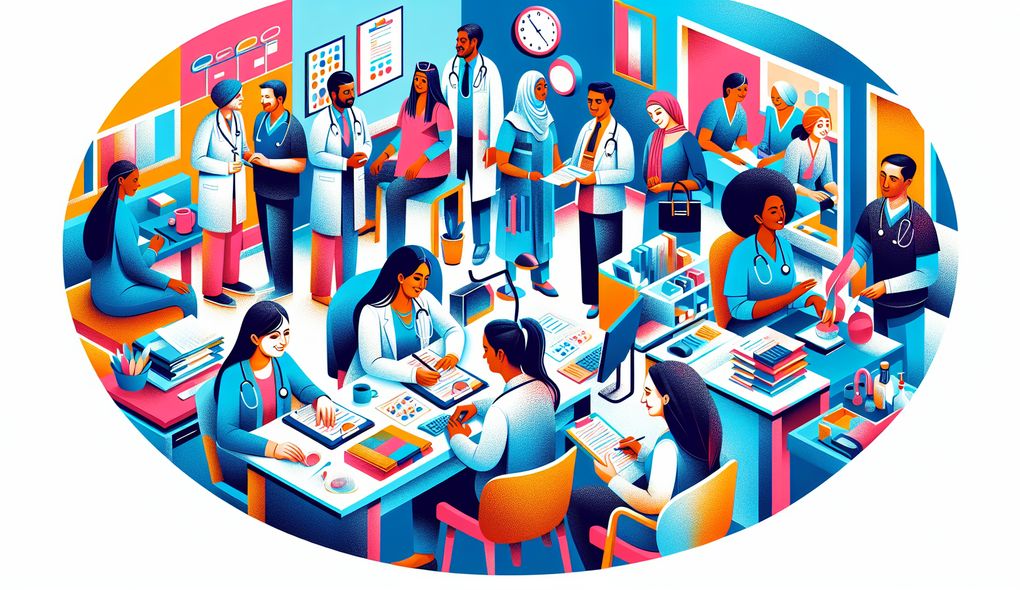How do you protect sensitive data and maintain confidentiality in a medical practice?
INTERMEDIATE LEVEL

Sample answer to the question:
In order to protect sensitive data and maintain confidentiality in a medical practice, it is important to implement various security measures. This includes securing the physical environment by restricting access to areas where sensitive data is stored. Additionally, electronic data should be encrypted and protected with strong passwords. Regular backups should be performed to prevent data loss. Staff should receive training on data security and understand the importance of confidentiality. Access to sensitive data should be limited to authorized personnel, and a log of access should be maintained. Regular audits should be conducted to ensure compliance with relevant healthcare laws and regulations.
Here is a more solid answer:
Protecting sensitive data and maintaining confidentiality in a medical practice requires a multi-faceted approach. First, physical security measures should be in place, such as restricted access to areas where sensitive data is stored and secure storage of physical documents. Electronic data should be encrypted and protected with strong passwords. Regular backups should be performed to mitigate the risk of data loss. Staff should receive comprehensive training on data security and confidentiality, emphasizing the importance of safeguarding patient information. Access to sensitive data should be limited to authorized personnel, and a log of access should be maintained. Regular audits should be conducted to ensure compliance with healthcare laws and regulations. Additionally, clear policies and procedures should be established to govern the handling and sharing of sensitive data. Finally, open communication channels should exist within the practice to address any security concerns or incidents promptly and effectively.
Why is this a more solid answer?
The solid answer provides more specific details on the steps necessary to protect sensitive data and maintain confidentiality in a medical practice. It addresses the evaluation areas by emphasizing the importance of attention to detail, knowledge of healthcare laws and regulations, ability to work under pressure and adapt to changes, and excellent communication and interpersonal skills. However, it could still benefit from providing real-life examples or experiences that demonstrate the candidate's ability to implement these measures effectively.
An example of a exceptional answer:
To ensure the protection of sensitive data and maintain confidentiality in a medical practice, a comprehensive approach is essential. Firstly, physical security measures should be implemented, such as access control systems and surveillance cameras to restrict unauthorized entry. Strict protocols for the handling and disposal of physical documents containing sensitive data should be established. Secondly, for electronic data, robust security measures such as encryption, firewalls, and intrusion detection systems should be implemented. Regular security assessments and penetration testing should be conducted to identify vulnerabilities and implement necessary patches or updates. Thirdly, staff should undergo continuous training to raise awareness about data security best practices and the importance of patient confidentiality. They should be educated on how to identify and report potential security breaches or incidents. Additionally, access to sensitive data should be role-based and regularly reviewed to ensure that only authorized personnel have access. Audit logs should be regularly monitored to detect any unauthorized access or suspicious activity. Finally, a comprehensive incident response plan should be in place to address any security breaches promptly and effectively, including notification of affected individuals and appropriate regulatory bodies. By implementing these measures, a medical practice can demonstrate its commitment to protecting sensitive data and maintaining strict confidentiality.
Why is this an exceptional answer?
The exceptional answer provides a comprehensive and detailed approach to protecting sensitive data and maintaining confidentiality in a medical practice. It addresses the evaluation areas by demonstrating strong attention to detail, knowledge of healthcare laws and regulations, ability to work under pressure and adapt to changes, and excellent communication and interpersonal skills. The answer goes above and beyond by providing specific security measures and potential vulnerabilities, as well as emphasizing the importance of continuous training and incident response planning. The candidate showcases a deep understanding of data security best practices and demonstrates their ability to implement and manage these measures effectively.
How to prepare for this question:
- Familiarize yourself with relevant healthcare laws and regulations, such as HIPAA, to ensure compliance.
- Stay updated on current security threats and best practices in data security.
- Research and understand different encryption methods and protocols for protecting electronic data.
- Be prepared to provide examples of how you have implemented security measures in previous roles or projects.
- Highlight any experience or training in incident response planning and management.
What are interviewers evaluating with this question?
- Attention to detail
- Knowledge of healthcare laws and regulations
- Ability to work under pressure and adapt to changes
- Excellent communication and interpersonal skills

